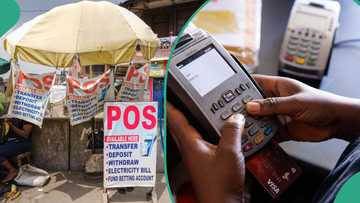CBN Lists 19 Frequently Asked Questions on New Electronic Foreign Exchange System and Answers
The Central Bank of Nigeria (CBN) recently introduced the Electronic Foreign Exchange Matching System (EFEMS) to address the decline of the naira against the US dollar and other currencies.
The impact of EFEMS has been evident, with the naira appreciating in both the official and unofficial foreign exchange markets.
In the official market, the naira recovered from an exchange rate of N1,688 before December 2024 to N1,539.55 as of Monday, December 23, 2024.

Source: Getty Images
In the black market, the naira's exchange rate against the dollar has dropped to N1,655/$1 as of Monday.
The effectiveness of EFEMS has sparked increased interest among Nigerians, with the CBN providing more information to meet this demand.
Here is a breakdown of what CBN said about EFEM
1. What is the Electronic Foreign Exchange Matching System (EFEMS)?
EFEMS is an electronic platform introduced by the CBN for conducting foreign exchange (FX) transactions in the Nigerian Foreign Exchange Market (NFEM).
It is designed to match, buy and sell orders automatically, enhancing transparency and governance in FX trading.
2. When will EFEMS be implemented?
EFEMS was fully implemented in the interbank foreign exchange market from December 1, 2024, after a two-week test run in November 2024.
3. What are the key benefits of adopting EFEMS for Nigeria's FX trade?
EFEMS provides real-time pricing and visibility of buy/sell orders, reducing opacity in the FX market.
Automated matching of orders ensures market participants transact at the best prices, reducing price manipulation and distortions.
The system limits speculative trading and reduces volatility caused by market distortions.
It enhances oversight, allowing better regulation and monitoring of FX activities.
Real-time data will be accessible to the public, contributing to a more informed and efficient market.
4. How will EFEMS work in the Nigerian foreign exchange market?
Authorized Dealers will use EFEMS to place buy and sell orders in real-time. The system will automatically match corresponding orders based on predetermined rules, ensuring swift execution of transactions.
All transactions will be reflected immediately in the system for market participants and regulators.
5. What changes will EFEMS bring to the current FX trading process?
EFEMS replaces the manual or less-automated trading processes with a streamlined, fully electronic system.
It introduces real-time transaction visibility and ensures that all trades are processed through a single, regulated platform, eliminating inefficiencies and manual interventions that may have previously led to market distortions.
6. What impact will EFEMS have on market rates?
EFEMS is expected to promote a market-driven exchange rate, meaning rates will reflect actual market conditions, leading to a more efficient and stable pricing mechanism in the Nigerian FX market.
7. Will EFEMS affect speculative activities in the FX market?
CBN said EFEMS is expected to reduce speculative activities by ensuring that all trades are conducted transparently and in real time.
This minimizes the opportunity for traders to exploit market inefficiencies or create artificial price movements.
8. Who will oversee and regulate EFEMS?
In collaboration with the Financial Markets Dealers Association (FMDA), the CBN will regulate the system. They will publish guidelines, rules, and real-time data to ensure compliance with the Nigerian FX Code and the revised Market Operating Guidelines for the Nigeria Foreign Exchange Market.
9. How can Authorized Dealers prepare for the adoption of EFEMS?
Authorized Dealers must ensure that all necessary documentation, training, and system integration efforts are completed before the go-live date. Dealers should familiarize themselves with the Nigerian FX Code and the revised guidelines to comply with regulatory requirements.
10. What role will the public play in the EFEMS framework?
The public will benefit from improved transparency, as real-time market prices and data will be accessible. This allows market participants, businesses, and individuals to make more informed decisions when engaging in foreign exchange transactions.
11. How will EFEMS contribute to Nigeria's FX market stability?
EFEMS will help eliminate speculative activities and price manipulation. It ensures that FX rates reflect actual demand and supply conditions, leading to improved market stability and better regulation.
12. The FX market currently trades on Refinitiv FXT. How will the adoption of EFEMS affect that?
With the introduction of EFEMS, Authorized Dealers (ADBs) will transition from the current trading platform (Refinitiv FXT) to EFEMS for all interbank FX transactions. EFEMS will become the central platform for trade execution and matching, ensuring all trades are conducted under the CBN's new governance framework. However, platforms like Refinitiv FXT may still serve as supplementary tools for conversational dealings.
13. How will EFEMS promote price discovery in the Nigerian FX market?
EFEMS will enhance price discovery by providing real-time visibility into buy and sell orders across the market.
This allows all participants to see the demand and supply for foreign exchange and exchange rates reflecting actual market conditions rather than being influenced by speculative behaviour or market distortions.
14. What matching platform is being proposed: can this be communicated to the market in writing?
The CBN is using the Bloomberg BMatch.
15. What is the scope of trade to be dealt with on the EFEMS (all FX or just Interbank)?
EFEMS is expected to cover all FX transactions, including interbank and trades with clients.
16. Will there be a minimum threshold for notional trades, and if so, will that be decided by the CBN or FMDA?
The Financial Market Dealers Association(FMDA)and the CBN collaborated on guidelines.
17. Are banks still allowed to voice trade or close bilateral trades outside the EFEMS platform?
No, all FX transactions, including bilateral deals and clients' trades, must be conducted through EFEMS to ensure market-driven pricing. Exceptions (if any) will be outlined in the system's operating guidelines.
18. What's the contingency plan for business continuity in case of EFEMS failure or glitch? Can the market fall back to conventional means of closing trades?
A robust contingency plan will be in place in case of system failures. The market is still expected to maintain access to conventional dealings as alternative options, with the permission of the CBN.
19. CBN said they will publish real-time rates, etc. On what platform will those be published? Will the published rate be considered the reference rate for the prevailing rate of USDNGN? If so, any details on how the CBN intends to compute the rate before publishing would be beneficial.
Real-time rates and key data from EFEMS will be published on the selected platform, the CBN official websites and other financial information services.
The rates would serve as the reference rate for USDNGN, and the methodology for computing and updating these rates will be communicated to market participants.
Naira becomes 3rd worst performing currency in the world
Earlier, Legit.ng reported that the Nigerian currency, the naira, was ranked among the top 3 worst-performing currencies in the world.
This data was released in October showed that the naira is only behind the Lebanese pound and the Ethiopian birr currencies.
PAY ATTENTION: Сheck out news that is picked exactly for YOU ➡️ find the “Recommended for you” block on the home page and enjoy!
Source: Legit.ng









